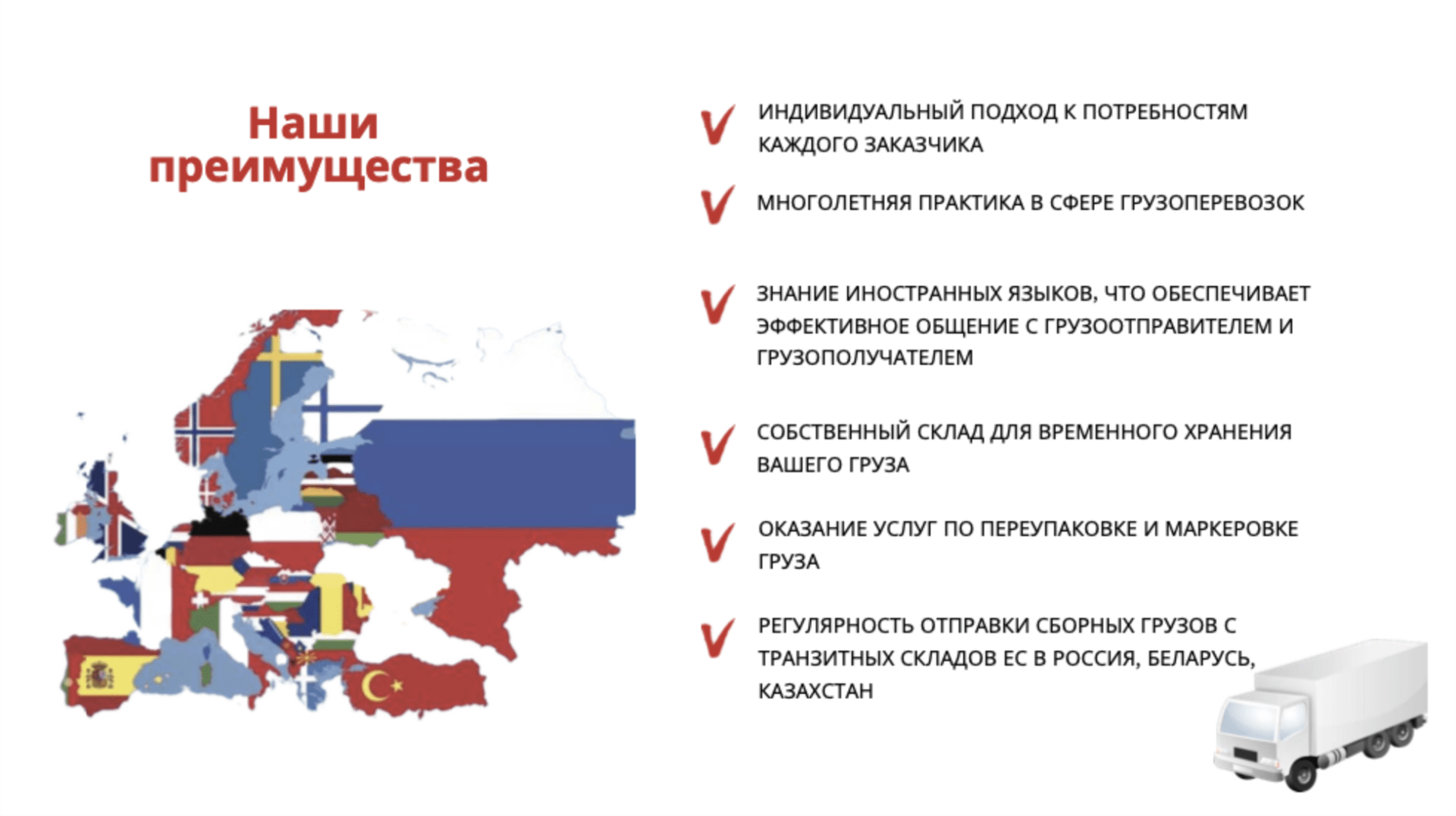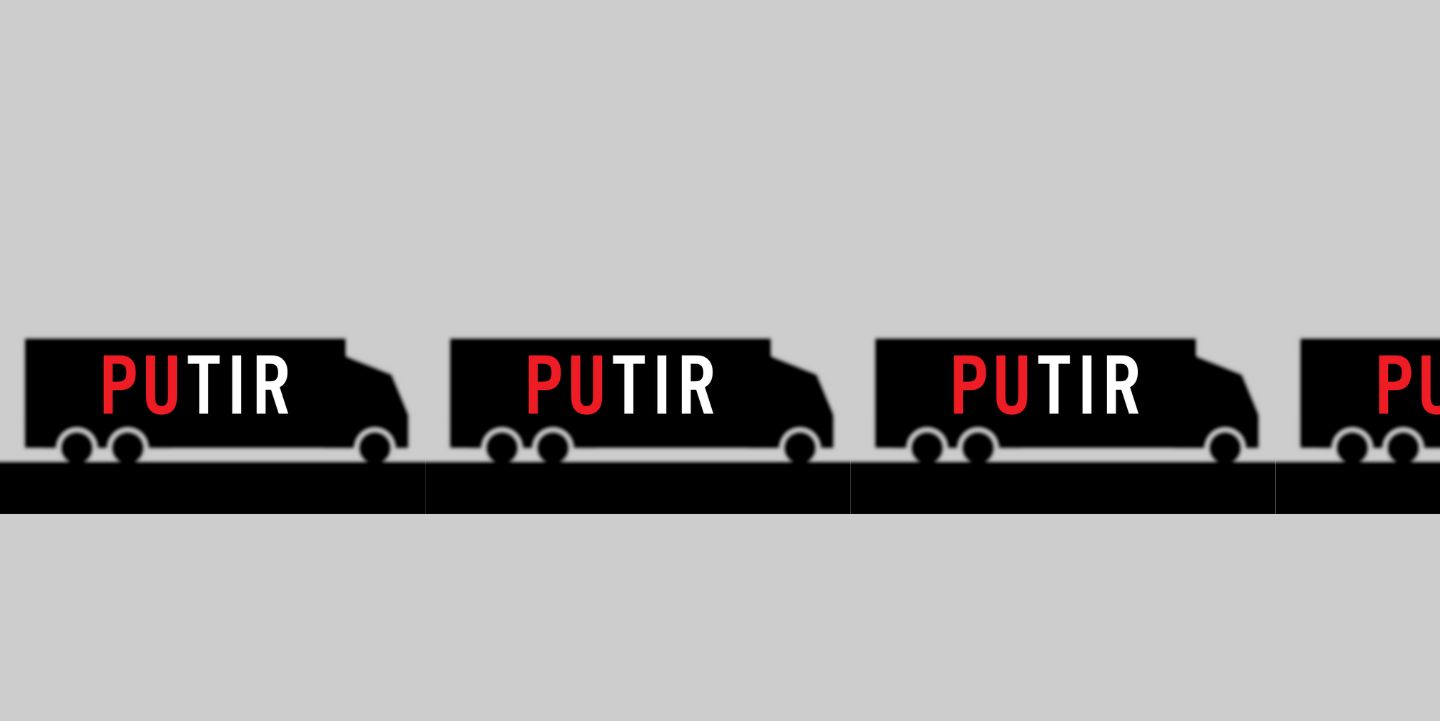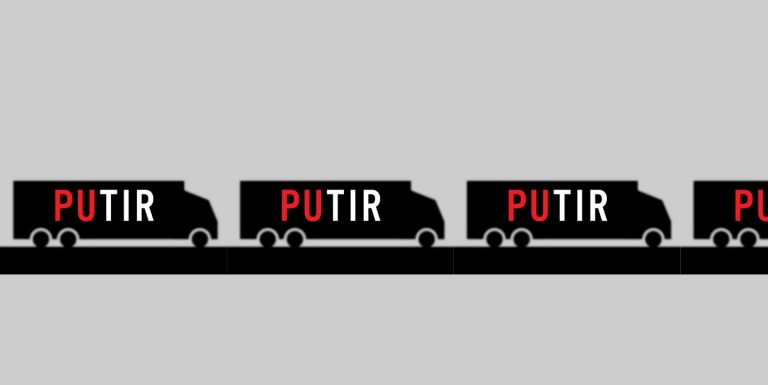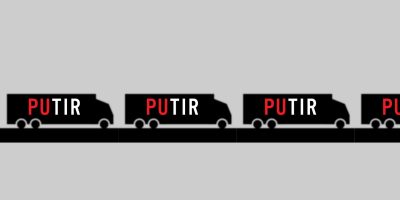by Anastasiia Morozova and Konrad Szczygieł
EU imposed sanctions on selected goods shipped to Russia and Belarus. Few transport companies found a way to transport them anyway, despite restrictions.
Over 88,000 trucks crossed the Polish-Belarusian border since the start of war. More than 40,000 did it in February alone. In that period, customs officers stopped 284 cargos with goods subject to sanctions.
Border Guard maintains that our borders are shut tight, and controls are thorough. We have decided to verify that claim, and found a Polish company that agreed to transport restricted wares.
This article was originally published in Polish on FRONTSTORY.PL
April 9, Polish-Belarusian border crossing at Koroszczyn is one of the key stops en route from European Union to Russia. Line of trucks stretches as far as the eye can see. Nearly 1200 vehicles wait for customs clearance, and border guards estimate that their drivers will have to wait at least 40 hours. All because of Ukrainian and Polish activists, who have been blocking, on and off, the way east.
Protesters point out that despite Russian invasion of Ukraine, European countries continue to trade with Russia. Trucks with Russian and Belarusian license plates haul medicines, food and construction materials, just like trucks registered in EU do.
On Saturday morning, April 9, this protest will end. The day before, EU imposed another package of sanctions. This time, restrictions will apply to Russian and Belarusian transport companies. Their trucks will not be able to cross into EU. It’s the next phase of trade war with Russia. Sanctions imposed in the last few weeks have banned the export of certain wares – i.a. steel products, luxury goods, electronics, and spare parts for cars and army vehicles – to Russia and Belarus. On April 15, Belarus closed its borders for trucks registered in EU as a reprisal for those bans.
FRONTSTORY.PL managed to establish that some companies are still willing to transport goods into Russia despite sanctions. We have followed a trail left by e-mail acquired by Lithuanian journalists from Siena.lt, In it was a business offer sent by one of Polish transport companies to their clients, describing how to bypass restrictions.
Sasha will transport you anything
“My name is Sasha (name changed, ed.), I represent transport and logistics company FHU XYZ (name changed, ed.) from Poland. We provide our own warehouse for reloading goods and further transport to Russia.” It is the opening line of an offer written in Russian and sent, along with advertising brochure, to clients of a transport company. E-mail is full of marketing catch-phrases – the company is unique because of its individual approach to every client, and because it specializes in transporting goods from EU to Russia, Belarus and Kazakhstan. The message ends with instructions on how to bypass sanctions: “If the product code is on the sanction list, but the sender provides documents stating that goods are for direct use, we can file EX (document attesting the export of goods that customs agencies issue using invoices, ed.).

Screen with the offer
What does it really mean? We’ve decided to find out by pretending to be a transport company with a shipment of iPhones bound for Moscow. We send e-mail, in Russian, to the address used by XYZ: “We are looking for transport from Błonie (near Warsaw). Goods: iphones, 15 europallets, 6 tons.” We don’t beat around the bush, getting this shipment to Russia can be tricky.
EU sanctions are clear. You can’t transport smartphones to Russia if their value exceeds €750. This certainly includes iPhones. When Apple pulled out of Russia, Russians started to boycott American company. That story made the news all around the world. Today, high-end phones are scarce commodity in Russia.
It takes one hour to get a reply. “We can write out CMR, and make EX (from Poland). Do you need dedicated transport or are you considering a shared one?” writes Sasha from XYZ.
CMR is an international waybill, commonly referred to as cargo passport. “Making EX”, as it’s called in transport slang, is a complex customs clearance procedure for issuing documents that confirm the export of goods. Such papers are issued by customs agencies based on invoices. Being a busy client, we will ask the forwarding agent to do it for us.
Machine parts? No problem
We accept the initial offer and ask about the costs. How much will we pay for a dedicated shipment, and how much if we share the transport space with other cargo?
“We recommend dedicated trucks for this kind of cargo, to limit the risk of damages. The cost is €3000. Trucks will have EU license plates,” replies Sasha.
One important thing – we are exchanging e-mails in the middle of protests at the border. Trucks and cars with Russian or Belarusian plates are being frowned upon. As Sasha points out, cargo transported by trucks registered in EU will be much safer. She clearly knows that our goods are valuable, fragile and must be handled with care.
“Before we can start the export procedure we need do get proper documents from you,” Sasha adds at the end. We have concerns. We doubt if our goods can reach their destination, meaning Moscow. Will there be any problems at the border, given the circumstances? Will we need any additional documents? Sasha is quick to soothe our fears: “At the moment, there are no transport restrictions for trucks with EU plates. You will need a split invoice. Plus, you will have to check if your product code is on the sanction list or not. If it is, you will need a document from forwarding agent confirming that your cargo will be used for the intended purpose. I will send you one to compare. But first, we will need that product code from you.”
We ask a forwarding agent with many years of experience, who works for a big international transport company, for help. “Split invoice” can be used as a way to obscure cargo value. For example, instead of shipping the whole cargo in one go, you can divide it into three parts. Each of those three transports will show a lower cargo value, and thus won’t attract customs officers’ attention, explains our expert.
We send our product code to Sasha, using one that is on the sanction list. We ask if her company had any problems with shipments to Russia, and if she can guarantee that their way of bypassing sanctions is effective.
“Transports reach Russia without any problems. Last week, we shipped a cargo of restricted goods from France”, writes Sasha. Suddenly, a procedure advertised as smooth and easy becomes a winding path. Sasha realizes there might be problems with iPhone shipment after all. “We can issue export authorisation but only for products with max value of €300. If it’s more, customs officers won’t let it through,” explains Sasha, and proposes to switch e-mails for phone calls. We call: “You wrote that you had no problems with shipments to Russia.”
“I’ve checked your product code with a broker. He claims that if the value is €300 or less, the cargo will reach Russia easily. If the value is over €300, it won’t cross the border,” explains Sasha. (She is wrong about the allowed value of exported iPhones, UE officials set it to €750).
“Most iPhones cost more than €300. And the shipment can contain different models, with different values.”
“Even if we could forge the documents, every customs officer knows the price of an iPhone. I think that transporting them undervalued is not realistic. We won’t be able to fill out the documents if we declare different cargo value, because there would a 90% risk of running into trouble at customs.”
“Is there any other way to solve this problem? Has anyone contacted you and asked similar questions?”
“All you need is a document from sender confirming that goods will be used for the intended, not military purpose. Last week, a shipment from France went through with no problem. Code was on the sanction list, but we had a document from sender attesting that spare parts will go to auto shops, and not army workshops where vehicles are fixed before being sent to war zones. We just showed that paper in customs office, zero problems,” says Sasha.
It looks like our iPhone shipment is troublesome. XYZ won’t take the risk. They will not issue documents for undervalued goods.
Seeing no chance for making a deal, Sasha stops replying to our repeated questions about iPhones. We lose touch.
Someone is bullshitting you
Is bypassing sanctions really that simple as forwarding agent Sasha claims? Is declaring any purpose other than the real one enough to get wares to Moscow problem-free?
We ask for another advice and show our e-mail correspondence with Sasha to Tomek who works at a global logistics company. “Yes, it really does look easy and efficient. And after so many years in this line of work, it doesn’t surprise me at all,” says Tomek and laughs. “Document attesting that goods will be used for intended purpose is issued by ordering party, the one which orders the transport. On paper, those spare parts are going to auto shops or for private use. But in real life, the recipient from Moscow can do whatever he wants with them, and that includes repairing combat vehicles. There is no supervision,” explains our expert.
What about the procedure suggested by Sasha? Is it legal? “In my opinion, it is not illegal, but certainly unethical. It’s operating in a legal grey zone with clear intent to bypass sanctions,” says Tomek in a firm voice.
XYZ Company is not big, but it’s growing. It was founded in 2006, and has offices near Siedlce. Company built its warehouses close to one of the busiest trade routes heading east, a highway connecting Warsaw with border crossing at Koroszczyn.
We dial XYZ office number. The owner is not there, but we manage to speak with Anna W., one of the employees.
“We would like to talk about the offer you’ve been sending to your clients. The one in Russian, explaining how to bypass sanctions.”
“How to bypass…?” Anna stops talking. “Which one of our employees sent that?” she asks.
We tell her about our e-mail correspondence with Sasha.
“I don’t look over every offer we send. But I don’t think it’s up to us. It is customs office and customs agencies business,” explains Anna. “Even if product code is on the sanction list, there are exceptions. For example, if goods are not intended for military use, and we have documents from sender confirming that,” Anna repeats the method we’ve heard before from Sasha.
“And that’s enough to move goods across?”
“If you want to know more, you should contact a customs agency. Because we don’t make EX ourselves, we order it from such agencies,” clarifies Anna, and adds: “Spare parts which can be used by military won’t make it across the border, unless the client provides papers attesting they will not be used for military purposes.”
“But such attest is just a piece of paper.”
“Again, it’s not up to us. It’s between the sender and the recipient of goods. When we have proper documents, we clear goods for export, and send the shipment on its way. We are not doing anything illegal. After all, these documents go to customs office and customs agencies. Our authorities gave it a green light. We can transport goods if we have attests. I don’t understand why you find it questionable.”
We call one of the customs agencies mentioned by Anna.
“I think someone is bullshitting you. We have goods which are not on the sanction list, but customs office won’t clear them anyway. They are nit-picking everything,” says customs agency employee, and then tells us about his last order: “I had a container full of oils and greases shipped from England. The thing is, these goods are on the sanction list. I couldn’t take them. And even if I used the method you’ve talked about, I would have a hard time trying to prove that oils and greases won’t be used for military purposes.”
We ask Lublin customs officers if the attest sent by ordering party is enough to transport goods that are on the sanction list across the border.
“When it comes to goods (…) customs officers (…) don’t ask people handling the shipment, or those submitting the goods for clearance, for documents attesting that products won’t be used for military purposes,” clarifies Michał Duraś, a spokesman for Lublin Tax Administration Office, in his e-mail. The attest is not important. The deciding factor is whether transported products are on the “dual-use goods” list. That is what customs officers verify first. Shipments stopped at the border return to senders.
Sanction contraband? Not happening
How many trucks transporting restricted goods have been stopped thus far?
“Between February 24 and April 12, Tax and Customs Service officers halted 284 shipments of sanctioned goods. Those shipments were detained by both local and border customs offices,” informs Ministry of Finance press office. Among halted goods were steel products, car spare parts, and luxury goods.
And what is the general attitude of transport sector towards sanctions? We ask Jan Buczek, chairman of Polish International Road Hauliers Association (ZMPD), the biggest transport agency in Poland. Many of its members transport goods east.
“We don’t fully understand the idea behind sanctions, and not many people do. No specific regulations were implemented. Instead, we were encouraged to protest declaratively. Many hauliers have no alternative because they specialize in transporting goods east and maintain excellent business relations there. If they stop suddenly, they’ll do Belarusian and Russian hauliers, who are itching to take over their contracts, a big favour,” says Buczek in defence of transport companies.
Buczek sees many cracks and holes in regulations that Russian and Belarusian companies can take advantage of.
“You can still transport goods if the contracts were signed before sanctions were imposed. That means we will surely see a growing number of those in the near future. It’s a perfect loophole for dishonest hauliers,“ explains chairman of ZMPD.
If the sanctions are to be effective and fair for everyone, trade with Russia and Belarus should be stopped completely. And that is what Buczek stipulates.
We ask him about bypassing sanctions.
“That kind of actions should disqualify any transport company from the market. Looking for loopholes to bypass regulations is reprehensible, at least.”
In Buczek’s opinion, hauliers shouldn’t be burdened with verifying whether the goods are on the sanction list or not.
“We can’t tell the difference. If our clients say that their goods are not on the sanction list, and provide us with proper documents, we have to believe they are telling the truth. There is a certain division of work in road haulage business. We, the hauliers, are the last link in a long chain of transport. Only few of us are in direct contact with people who make the orders. Usually, that part is handled by logistics companies or forwarding agencies. It is they who have more means to check and verify if products are on the sanction list or not,” explains Buczek.
Everyone does it, Poles and Lithuanians more than others
Has road haulage business changed since the start of the war in Ukraine? We ask Jakub Jakóbowski, Centre for Eastern Studies (OSW) expert, and coordinator of the research project on transport and logistics connections in Eurasia.
“There is a drop in number of shipments in all crucial modes of transportation. And road transport is the main supply channel for maintaining production and consumption continuity in Russia,“ explains Jakóbowski.
Statistical data shows that about 2,000-3,000 Polish hauliers, out of 37,000, transport goods east.
“It’s hard to measure their share of the Russian market. We know how many permits to enter Russia and Belarus were issued in total. It’s 220,000 and 180,000, respectively. One permit means one transport. Based on that, we can estimate who gets the most permits. Polish and Lithuanian hauliers do, and that puts us at the forefront. But there are Russian and Belarusian transport companies active on that market as well, so it’s rather hard to evaluate it comprehensively.“
OSW expert compares road and maritime transport, and points out that shipowners boycotted Russia more often than road hauliers.
“Big European shipowners stopped shipping containers to Russia right after the first package of sanctions. Only ships with medicines and humanitarian supplies reach Russian ports now,” says Jakóbowski.
And what changed after Belarus closed its borders for trucks registered in EU?
“EU sanctions and the ban issued by Belarus in response virtually blocked the whole transport east,” says Jan Buczek, chairman of ZMPD. “For 10 years, Belarusians have been developing their logistic centres, and now, they’ve decided to use them for repackaging cargo. Polish hauliers will be barred from that market, and companies from Russia and Belarus will take their place.”
According to Buczek, most Polish hauliers won’t transport goods to Russia, and further east, through Lithuania and Latvia.
“It is hard. I talk to them all the time. The majority is considering pulling out of those markets completely,” says Buczek.
Hauliers are afraid that Russia will soon issue similar bans as Belarus.
“Transporting goods to Mongolia and back takes about 3 to 4 weeks. If Russia issues a ban for EU hauliers, and gives them very little time to leave the country, they won’t risk getting stranded there, because their trucks are their livelihoods,” explains Buczek.
He also paints another grim picture. Belarusian hauliers who have companies registered in Poland will take over the transport to Russia, and further east.
“These companies can transport goods within EU. So, Belarusian hauliers can safely transport goods to Mongolia, and on their way back, attach trailers to trucks registered in Poland. That way, Polish hauliers will be tossed out of the game,” sums up chairman of ZMPD.
Over 88,000 trucks have crossed Polish-Belarusian border since the start of the war in Ukraine until April 14. On April 15, those trucks still formed long lines at the border crossings, transporting goods to Belarus and Russia. Drivers who entered Belarus before the ban was issued must leave the country before April 23.
Translated from Polish by Michał Kompanowski
Polish investigative outlet created by Reporters' Foundation.






